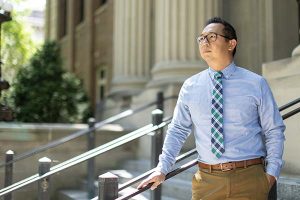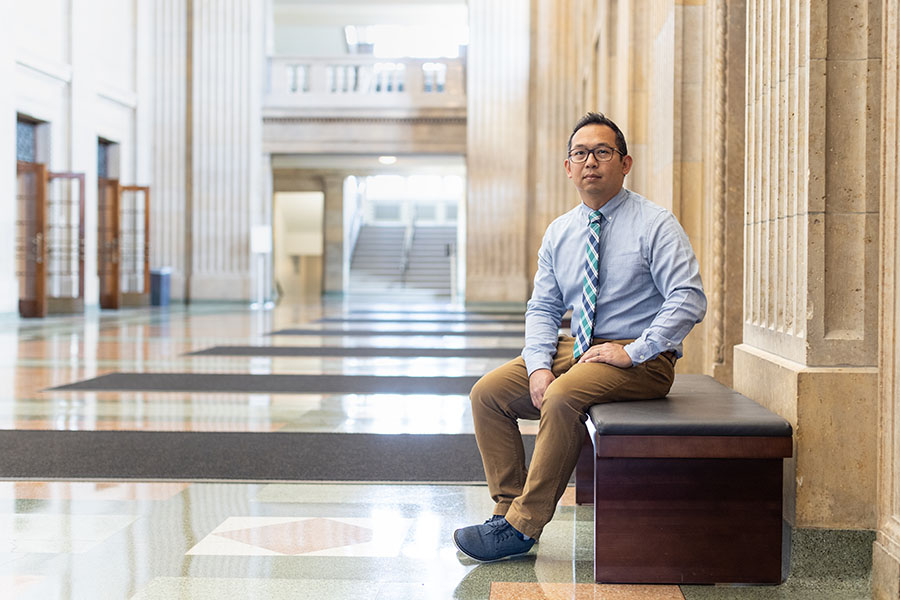Introduction
What most excites you about the SPH Strategic Plan for Antiracism?
“I’m excited that we’re at this stage in our work. I’ve spoken with colleagues at other institutions who are developing strategic DEI plans, and many of them say that they start and stop, start and stop, but don’t follow through to implementation. I have confidence that, as an institution, SPH is really moving forward in this work and is doing so honestly, collaboratively, and with a holistic view about how we can all thrive at SPH.
I’m very proud to be part of an organization that is listening to many perspectives, is engaging in challenging conversations, and is willing to change and take action.”
Commit
Using “commit” emphasizes a pledge to prioritize antiracist efforts in making SPH a more welcome, equitable, and just organization.
Recently some U.S. states, cities, and counties have declared racism a public health crisis or emergency. What is the importance of those declarations?

“As an Asian American male and a first generation American, I have a specific perspective when it comes to racism in this country and the impact that it has. Racism can create barriers to opportunities and knowledge related to health. For some people, there is stigma in going to the doctor or seeking medical attention due to issues of masculinity or fear that others won’t understand their accents, language, or cultural background. If we can minimize or eliminate these barriers, then we can create better health outcomes.
Public safety is also a consideration. Anti-Asian sentiment and incidents have become more visible in recent years and are creating a crisis for our community. For example, elders and women in our community are sometimes afraid to walk around, go to the grocery store, go to church, or walk the dog. This heightened racial tension takes its toll on the physical and mental well-being of communities like mine.”
What do you see as your role in antiracism?
“My role is to infuse my own personal experiences as a person of color and a first-generation American and my understanding of cultural dynamics into my role recruiting students to SPH. I have honest conversations with prospective students and empower them to be advocates for themselves as they enter the school.”
How do you approach student recruitment from an antiracist perspective?
“I am committed to understanding the barriers to entry for graduate school and the systemic issues that prevent students from seeking advanced education.
I work with students who come from all different backgrounds — many first generation students and first generation Americans — and I work with each student individually to help them break down the application process. I receive queries from students that give me better insight into common issues that students face so we can prevent those things from happening in the future. For example, are we creating barriers by overcomplicating things or not giving enough examples? Those aspects of the process — how we communicate, how we present ourselves, how we counsel students on the process for applying and enrolling in graduate school — are very important.”
Challenge
We are “challenged” to accept that racism exists and to “challenge” it when we see it.
What challenges do we face in prioritizing antiracist efforts?
“Our key challenge is getting everyone in our community involved. Often I see the same people who show up again and again to do this work, and typically that’s just a small percentage of the whole. The challenge will be getting everyone to commit and take action. As a predominantly white institution that was built on white supremacy, even though we are so far removed from that starting point, many of the original systems and policies are still in place and it’s going to take effort from everyone to change them.”
Change
We have to be willing to “change” and shift our beliefs, attitudes, and actions toward equity and justice.
What impact do you think the school can have on racism?
“SPH can have a significant impact due to its size, its reputation, and its national and international platform.
The very fact that we developed this strategic plan and had a public rollout to make it known is speaking it into existence and leading by example. It signals that we stand by this plan not only through words, but through resources and opportunity, and hopefully that will draw attention and call other organizations to the work.
Also, we have amazing faculty and staff who are influential in the healthcare community and students who are aspiring professionals. If we take this work with us into our professional circles, it can have an exponential impact. For example, when I speak to one prospective student about all the work that’s being done in the school, even if that student decides not to come to SPH, they still leave knowing that SPH is doing this work and maybe they’ll go and find similar commitments in other places. There are many domino effects that can come out of this.”
How will you need to shift your own beliefs, attitudes, or actions toward equity and justice?
“I need to change my own personal attitudes toward engaging in policy and procedural conversations. I’m learning to speak up and call things out. Whether or not things will change, I don’t know, but at least I’m speaking up as an advocate.”
“Building Equity, Driving Justice: Commit | Challenge | Change” — ties all communications related to the SPH Strategic Plan for Antiracism together under one look and feel. The theme showcases our guiding principles, and it motivates and inspires. "Agents for Change" profiles support this theme and all interview questions are related to the action words, Commit, Challenge, Change, as described above.
Submit an idea for this profile series — either your own story, or one that inspires you from another SPH individual or group.

